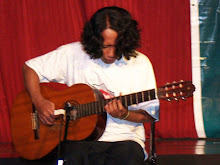.jpg)
The Iraqi journalist who threw his shoes at U.S. President George W. Bush in a supreme insult has suddenly become the talk of Iraq.
The little known Shi'ite reporter said to have harbored anger against Bush for the thousands of Iraqis who died after the 2003 U.S.-led invasion, had previously made headlines only once, when he was briefly kidnapped by unknown gunmen in 2007.
TV reporter Muntazer al-Zaidi remained in detention on Monday, accused by the Iraqi government of a "barbaric act."
His employer, independent al-Baghdadiya television, demanded his release and demonstrators rallied for him in Sadr City in Baghdad, the southern Shi'ite stronghold of Basra and the holy city of Najaf, where some threw shoes at a U.S. convoy.
"Thanks be to God, Muntazer's act fills Iraqi hearts with pride," his brother, Udai al-Zaidi, told Reuters Television, demanding that the Iraqi government free him.
"I'm sure many Iraqis want to do what Muntazer did. Muntazer used to say all the orphans whose father were killed are because of Bush."
Zaidi shouted "this is a goodbye kiss from the Iraqi people, dog," at Bush in a news conference the U.S. president held with Prime Minister Nuri al-Maliki during an unannounced farewell visit to Baghdad on Sunday.
The journalist then flung one shoe at Bush, forcing him to duck, followed by another, which sailed over Bush's head and slammed into the wall behind him. Throwing shoes at someone is the worst possible insult in the Arab world.
Zaidi was dragged struggling and screaming from the room by security guards and could be heard shouting outside while the news conference continued after momentary mayhem.
'BARBARIC'
The Iraqi government said Zaidi had carried out "a barbaric and ignominious act" that did not correspond to the role of the media.
"He tried to attack the visiting president," the media center of the council of ministers said in a statement.
"At the same time that we condemn this ignominious act, we call on the television channel of this reporter to deliver a public apology for this act which sullies the reputation of all Iraqi journalists and the whole media."
Al-Baghdadiya television demanded Zaidi's immediate release, "in accordance with the democratic era and the freedom of expression that Iraqis were promised by U.S. authorities."
It said that any harsh measures taken against the reporter would be reminders of the "dictatorial era" that Washington said its forces invaded Iraq to end.
Zaidi, now in his late 20s, spent more than two days blindfolded, barely eating and drinking, after armed men forced him into a car as he walked to work in November 2007.
He said at the time that the kidnappers had beaten him until he lost consciousness, and used his necktie to blindfold him and bound his hands with his shoelaces.
He never learned the identity of the kidnappers, who questioned him about his work but did not demand a ransom.
Colleagues of Zaidi say he resented President Bush, blaming him for the bloodshed that ravaged Iraq after the invasion. It did not appear that he had lost any close family members during the sectarian killings and insurgency, which in recent months have finally begun to wane.
A small number of supporters of anti-American Shi'ite cleric Moqtada al-Sadr called for his release in Basra, the southern city that controls Iraq's oil exports.
Larger groups of Sadrists also protested in Baghdad's Sadr City and in the Shi'ite holy city of Najaf. In Najaf, witnesses said demonstrators threw shoes at a passing American convoy. (Reuters via Yahoo)




No comments:
Post a Comment